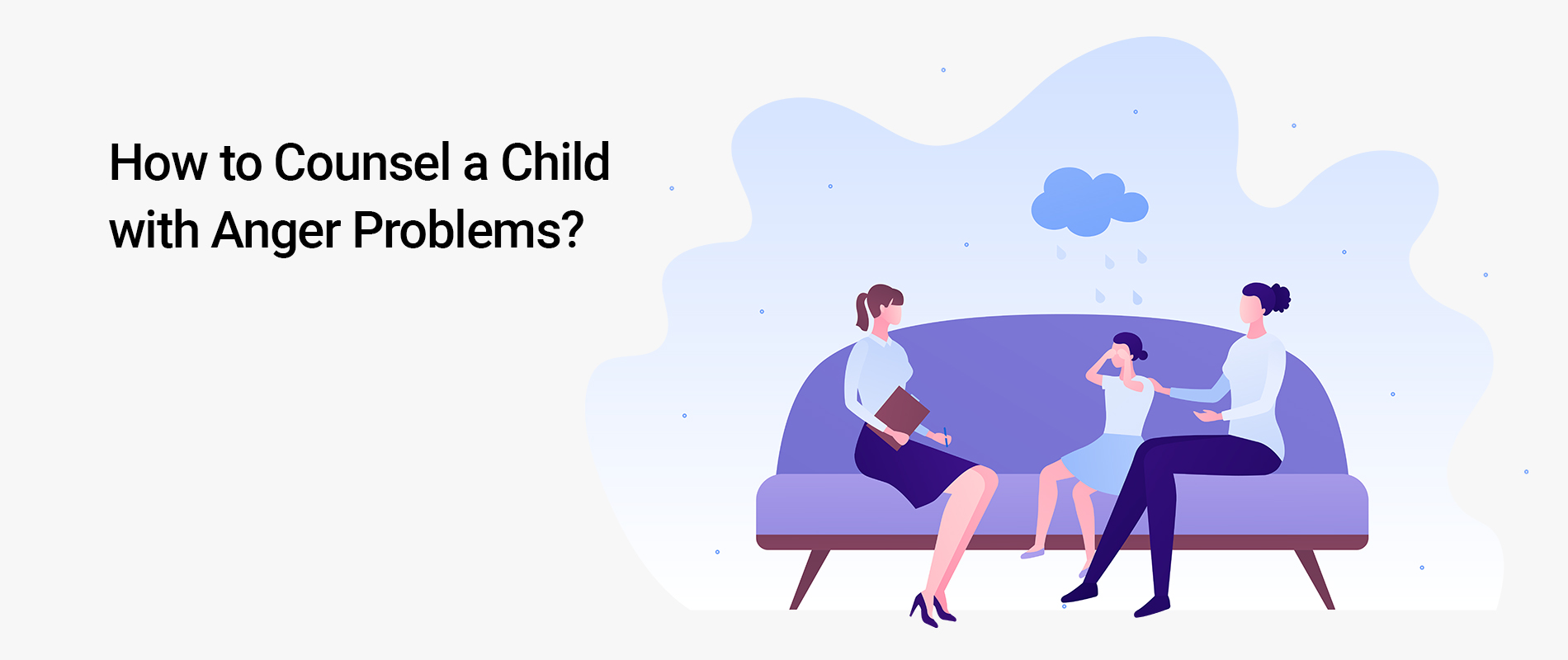Table of Contents
Handling a child’s anger is the biggest task for parents or for the caregivers. Try to remember the anger outbursts that your child had in the super market when you refused to buy them their favourite packet of chips or when you asked them not go on the playground with their friends just for a day. Can you remember their red faces, watery eyes, their irritation, their anger?
Now try to remember what you did when your child had an anger outburst. Disciplined him/her by showing authority, punished them by not letting them watch their favourite series, screamed at them or worst of all- slapped them. But did that prevent their intense way of expressing the anger? Probably not, because your child might have gotten used to these ways. But then how to deal with your child’s anger?
Related Blog: Child Counselling: Types, Benefits, Importance, Challenges
What Is Anger Management for Children?
Surely you have heard anger management for adults, but for kids? Is it even possible? The answer is yes. Anger management in children needs to be started by telling them that anger, like all the other emotions, is a natural emotion. This needs to be done because as parents, you have a demand that your child should never get angry, whereas what you mean is that they should show a healthy expression of their anger.
In anger management for children, one should tell them the difference between ‘feeling angry’ and ‘behaving in an angry way’. Most of the times anger is formed because of different feelings like sadness, helplessness, feeling hurt etc but it comes out in form of anger when we see the behaviour. Here, making your child understand that talking about feelings is important can help.
In all when it comes to anger management for kids, they need to be taught to remove themselves from the anger causing situation for a few minutes, think about their feelings and then react. Now this might sound difficult but it isn’t!

What Causes Anger Issues in a Child?
In younger children, anger can be caused because they are unable to articulate their wants or their needs. Their helplessness causes them to be irritable and that can be said to be their anger.
In older children, anger can be caused because of many things. Let’s see what those can be-
- Genetic factor.
- Observing parental anger and trying to copy it.
- Parenting style.
- Neglection from parents, caregivers, teacher etc.
- Abuse and maltreatment.
- Not able to achieve their academic goals.
- Unhealthy environment at home.
- Sibling rivalry.
- Parental discord.
- Mental health conditions like Autism, ADHD etc.
7 Ways to Help an Angry Child:
Anger, as we know, is one of the basic emotions. This emotion develops in children as it does in adults. Anger management doesn’t mean teaching children how they should not get angry or how it is bad, rather it helps children to manage their behavioural manifestations when they become angry.
Here are 7 ways which will help you as a parent, caregiver, teacher or family member to help any child who is angry:
1. Be authoritative than being authoritarian:
Authoritative parents do not show their dominance over children, rather they make they try to be assertive with parenting. You can show this by your body language- kneel down to your child’s eye level, look into your child’s eyes when you are talking to them, let your tone be light even if the child is screaming or crying. These should be the first steps during your child’s anger outburst.
2. Take them out of the situation:
If the child doesn’t stop throwing tantrums, take them to a place where there aren’t many people and tell them you will listen to them only when they talk in a softer tone or when they stop crying. If the child is very young, say 5-6 years then distract them by showing them something else.
3. Name the feelings:
As stated earlier, anger is mixture of different feelings. So, ask your child what are they feeling. Do they feel unimportant? Are they feeling neglected? Name it and teach them to recognize the feelings.
4. Anger thermometer:
This is one of the best anger management activities. This helps the child to understand what to do when they experience anger of different levels.
Here’s an example of anger thermometer –

5. Do not give in
Children are extremely smart. They understand the patterns very well. If you give in to their needs when they cry of throw any anger tantrum, then they will use the same behaviour to get whatever they want from you. Be firm that no matter how they behave, they will not get whatever they have asked for until they calm down and talk normally.
6. Educate them about techniques
There is a lot of content on the internet and lots of books on children’s anger management which incorporates different techniques. Research about it and tell the children about how to use these techniques when they get angry.
7. Avoid violent content
Violent media affects everybody’s wellbeing. Children tend to catch these violent actions and incorporate it in their behaviour. Try to avoid showing the children any movies or series which have violent action scenes. Along with that, avoid fighting or getting angry in front of kids as they pick it up from parents and behave accordingly, which in psychological terms is called ‘learned behaviour’.
When To Seek Help For Anger In Children?
You need not wait for a moment to arrive to make a decision whether to opt counselling for your child. But if you are confused about it then let’s clear your confusion! While temper tantrums and aggressive behaviour are common in children, we need to look for behaviours which differ from normal anger outbursts.
You should seek help for your children when it comes to anger issues when-
- He/she has frequent anger outburst.
- He/she tend to show anger more in social areas.
- He/she is not ready to change the behaviour.
- His/her anger outburst or temper tantrums like kicking, throwing things, crying lasts for more than 10 minutes every time.
- He/she is verbally abusive.
- He/she physically hurts themselves or others.
- He/she has extreme mood changes.

In all, anger is a worldwide experienced, one of the common emotions. It is developed in childhood and that is okay. What is not alright, is turning a blind eye towards the child’s repeated angry behaviour, thinking that it will go away with their growing age. Rather if this behaviour is not modified, then it will show other shades in adulthood. Extreme aggression, hurting others verbally or physically, thinking that others will listen to me if I show my anger are all behaviours of adulthood which stem from untreated anger in childhood.
Extreme anger could also be because of childhood mental health conditions like Autism, Attention Deficit Hyperactivity Disorder, Oppositional Defiant Disorder, learning difficulty or disability etc. But with counselling, these issues can be tackled!
Need Help & Support For Anger Management In Children?
Understanding the importance of child counselling and especially the anger issues in children, we at WAITT have a separate branch of child counselling with the best child counsellors. To make an appointment or enquiry, please visit our child counselling service.









